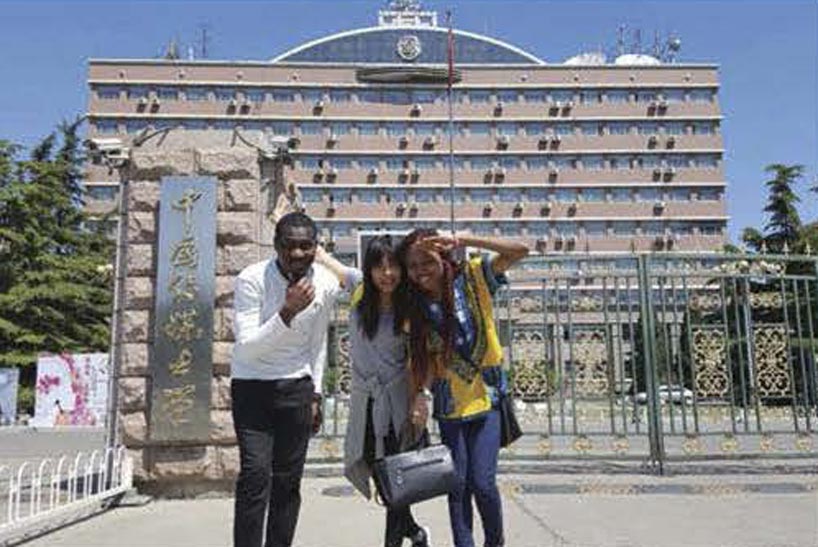

“The many dialects of China”
Obodoefuna Doris Chigozie (Nigeria): “The ways northerners and southerners speak in general feel quite different to me. Their different ways of speaking reflect their different personalities, and from their dialect you can tell roughly where they’re from, and what kind of personality they may have, since personalities differ from region to region as well.”
What’s China really like in the eyes of foreigners? Which parts of Chinese culture are the most attractive? What are their personal experiences while learning Chinese language? Are there any touching stories that happened to them during their stay in China? You will find the answers here. After reading the following stories, don’t you have the desire to pick up your pen and put down something in Chinese about things around you?
By Obodoefuna Doris Chigozie
(Nigeria, Communication University of China, Master of Teaching Chinese to Speakers of Other Languages)
Before I came to China, I thought that my Chinese was already quite good, but after arriving here I realized that I couldn’t understand people! The Chinese compare their various dialects and accents to the operas in northern and southern China. Looking back on my years as a sn1dent in China, my time there seems like a saga of struggling with these local operas.
It is quite normal for different people to speak the same language with different accents. For example, Americans and Europeans speak English with different accents, and the same applies even more for Africans and Asians speaking English. Chinese is like this as well, but I never imagined that within the same country people from different regions speak such vastly different versions of the same language.
When I spoke with Chinese people in Nigeria I was aware that those from different regions had different pronunciations. After studying and working in Nigeria for about three years, these differences had an influence on my own pronunciation, especially the Mandarin spoken by southern Chinese.
It was after I came to China that I fully understood that there was more than differences in pronunciation between people from the north and south. In terms of vocabulary each area varied vastly as well, the lexicon sometimes being completely different. At first I was studying at Communication University of China, and on campus everyone spoke standard Mandarin, which I could understand, so [didn’t realize it then. But one day when a friend and T took the bus to go shopping at the Buy-Now electronics market, I gradually came to grasp the reality of the situation.
At the time I had been in China for just under three weeks. As an exchange student who could study, listen and speak in Beijing with relative ease, I could not believe bow shocked I was at the time. Fortunately a Korean classmate took me there, otherwise I surely would have taken the bus to the final stop instead. Since the bus’s speaker was broken, the stops were not announced as we reached them, except by the lady selling the tickets, who would remind us of which stops we were arriving at. The way she spoke was like singing to me, really fast, and with lots of retroflex finals. All I could only hear were the retroflexes at the end of the words, and sometimes the consonants, but the vowel finals were completely incomprehensible to me. So I could hear her but couldn’t get what she was saying, like when I first started learning Chinese and everything went right over my bead. Later I realized that this lady was speaking authentic Beijing dialect, which is the basis of the standard Mandarin that we learn. There are lots of retroflex finals in Beijing dialect, and sometimes the intonation is really interesting. After I came to this conclusion, I realized that I bad started to sound more and more like a Beijinger as well.
While learning Chinese, I bad heard that Guangdong was one of the most developed provinces in China, so during the school break T decided to take a trip there and get an idea of the cultural atmosphere of Guangdong. Once I arrived there I found it even more interesting than r had expected. I had learned that Guangdong had its own dialect, but I didn’t find it very difficult to understand the Guangdong Chinese people I met in Nigeria, whose Mandarin was not very standard. I never imagined Cantonese would be so vastly different from the Mandarin I had learned.
While taking the subway in Beijing, I bad already become used to hearing the recorded announcements in two languages, Mandarin and English. But taking the subway in Guangdong was very different, because they were in three languages, English, Mandarin, and a third strange language I had never heard before, and couldn’t understand at all. Then I finally realized that, wow, this is Cantonese! Although I couldn’t understand it, r stayed in Guangdong for a week and, since I was interested in Cantonese, I learned a few phrases, like: “You’re pretty!” (leih houh leng a!), “Have you eaten?” (leih sik joh faan mei?), and “What’s your name?” (leih giu me meng a?), all of which had very different tones and vocabulary from those used in Mandarin, so I found this dialect very enticing.
Later, when talking to a student from Sichuan at our school, I realized that Sichuanese people have a lot of their own local idioms, and a lot of words they use are different from Mandarin. For example, when saying something is good or they’re in a good mood they say “anyi”, instead of eating lunch they say “chi dangfan”, eating meat is “da yaji”, and when cheering someone on they say “xiongqi!”.
The ways northerners and southerners speak in general feel quite different to me. Their different ways of speaking reflect their different personalities, and from their dialect you can tell roughly where they’re from, and what kind of personality they may have, since personalities differ from region to region as well. The way southerners speak Mandarin sounds really nice to me, which made me want to go study southern dialects. The southern Chinese dialects embody the gentleness of the people from the water villages in the south, and the Chinese describe these dialects as being soft and delicate. So when speaking to southerners, I always feel like I should lower my voice; whereas northerners tend to speak quite loudly, or this may just be because of all the retroflexes. The northern dialects are just like the terrain of northern China, with their vast plains and grass lands, dry with powerful wind. Likewise, people who speak these dialects are usually very open and direct, with great appetites for liquor and meat. When speaking with them, if something funny comes up, they can’t help laughing heartily, feeling that there’s no reason to hold back. Whenever I hear one of my teachers speaking with retroflexes, I’ll always find myself being interested in their classes. And when I’m hanging out with my Beijing friends, just listening to them talk makes me feel happy, and sometimes I’ll smile, but they have no idea why I’m smiling. The Beijing retroflex final is one of the most interesting sounds in Chinese to me. In the fun1re I’m sure to get lost in the fun of this romantic and interesting sound. Meanwhile, the exotic dialects of the south will occasionally appear in my mind, becoming a sort of linguistic getaway.
The charm of the Chinese language, or culture, is by no means limited to China’s many dialects. I intend to continue my journey of learning throughout this expansive land, searching for more and more of China’s secrets.
Published in Confucius Institute Magazine
Number 47. Volume VI. November 2016.
Number 47. Volume VI. November 2016.

























No hay comentarios:
Publicar un comentario